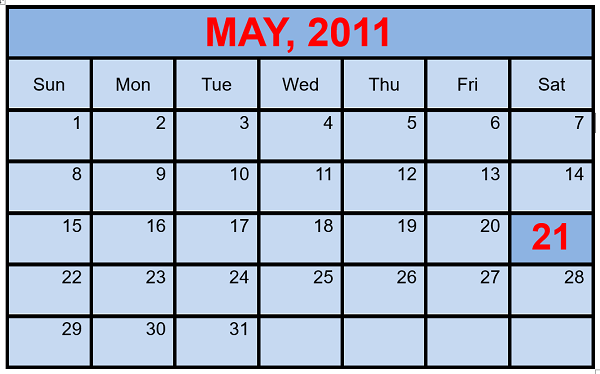October 13, 2010.
(Written October, 2010) Which will it be? May 21, 2011, October 21, 2011, or December 21, 2012? It reminds me of when I was a kid. One day in high school I watched the clock reach 12:00 noon and it just kept on ticking. The world did not end as someone had predicted. I still had to attend school. I still had to do my assignments.
Remember all the hype surrounding Y2K? And now it’s 2011 and 2012. The 2012 predictions come from a combination of Mayan calender calculations, New Age ideas, extravaganza movies, and vivid imaginations. For some, it is to be the start of a new age in human consciousness, whatever that means. For others, the end of the Mayan calendar means the end of the world. Some factor in various astronomical events coinciding with the Winter Solstice of 2012. I have read that the real living Maya in Mexico think that all the hype about 2012 is “a gringo invention.”
Some others say the Bible predicts the end of the world in the year 2011. May 21, 2011 is slated as the date of the rapture and the following October 21 as the end of the world. Harold Camping, founder and president of Family Radio, if not the originator of the claims, is at least a prime promoter. Camping believes he has new revelations from God: “Because it was not God’s plan to reveal this information until the end of time, this information concerning details of the time of the end of the world was deeply hidden in the words of the Bible.” “We must seek”, says Camping, “the spiritual truth hidden within each illustration and each anecdote and each historical event recorded in the Bible” (from his book, “We Are Almost There”).
It is easy to get lost as Camping connects unrelated Scriptures, selects numbers from here and there, and gives each his own meaning. It is far too complicated to examine all his disconnected arguments. But I found an anonymous tract on line that upholds Camping’s views and explains a central tenant of those views more concisely than Camping’s book:
“Historically, as God spoke these words [Gen. 7:1-4], there were seven days remaining for Noah, his family, and the animals to get into the safety of the ark; but spiritually, and the Bible is a spiritual book, God was speaking to all of the people of the world and was declaring that sinful mankind would have 7000 years to find refuge in the salvation provided by Jesus Christ. How can we know that? We know this is so based on what we read in 2 Peter, chapter 3.” Camping and his followers date the flood at 4990 B.C. Moving forward 7,000 years bring you to 2011, which will be the year of Jesus’ return. Why? In 2 Peter 3, Peter connects Noah’s flood to the Second Coming and he says that a day is a thousand years. So, the seven days before the flood represent 7,000 years before Jesus returns. Does that sound wild? I agree. Let’s just consider one of the many things wrong with it.
Since early times, the fact that God considers a day as a thousand years has been abused by Bible believers. Why do people not read the entire statement? “One day is with the Lord as a thousand years, and a thousand years as one day” (2 Pet. 3:8) What a contradiction! There is absolutely no mathematical sense to that statement; no key to calculating anything. And that is exactly the point. The literal contradiction is simply a vivid way of telling us that God lives outside of time. There is a similar statement in Psalm 90:4: “A thousand years in your sight are but as yesterday when it is past, and as a watch in the night.” “Yesterday” is 24 hours. A night watch is 3 or 4 hours. This verse is not math. Rather, it is saying that God as not time-bound. There is no key in such statements for us to calculate anything.
Over and over in Scripture we are given the warning “Watch therefore, for you know neither the day nor the hour wherein the Son of man comes” (Matt. 25:13). Our job is not to try to figure out when Jesus will return. Our job is to be ready at all times, so that we are ready whenever He returns. “Be you therefore ready also: for the Son of man comes at an hour when you think not” (Luke 12:40).
